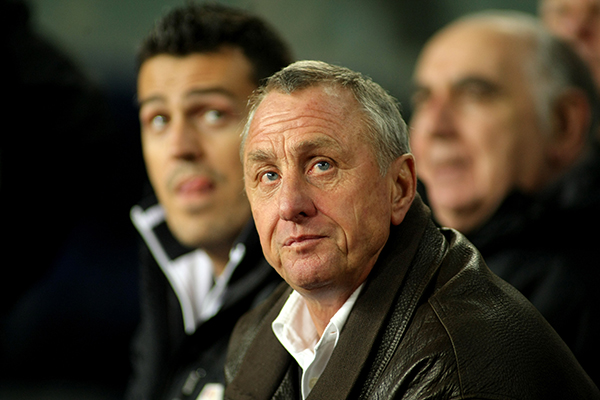It’s hard to imagine the Netherlands not being one of the top football (soccer) countries in the world. But before the late 60s, the Dutch football program had not won any significant titles or matches since before WWII, and the Eredivisie (the highest tier of football) was not much more than a group of semi-professional teams that entertained the local fans but didn’t make much of an impact beyond Dutch borders.
That was until a young player from eastern Amsterdam began playing for the Amsterdam-based Ajax team and began to transform the Dutch football program. Johan Cruyff entered the Ajax youth division when he was 10 years old and made his Eredivision debut when he was just 17. Though the club finished last that year, the following years Cruyff’s influence began to show: Ajax won the national title the following several years, Cruyff was the highest scorer in two of those seasons and he was named Dutch footballer of the year three years in a row. Johan Cruyff went on to take Ajax and the national team to championship after championship and helped create the foundation for the international football powerhouse that it is today.
But the most remarkable part of Johan Cruyff’s story goes beyond the number of games, championships, titles and trophies. It’s how he played the game and how he transformed the way it was played. For Cruyff there was a difference between how you play the game (an athletic competition between two teams) and how the game is played (the philosophy behind the game and how that developed the team). Not only was he himself an outstanding footballer, but he introduced several revolutionary principles that transformed the sport – including ‘total football’, a method of playing where a player who moves out of his position is replaced by another player from their team to help maintain the team’s on-field structure. This method of playing completely changed the Dutch football program and gave the national team the moniker ‘Clockwork Orange’ for their precision and teamwork.
Then, during a 1974 World Cup group game against Sweden, Cruyff stunned the football world when he executed a fake-out against one of the Swedish defenders. Being heavily guarded by the Swedish player, Cruyff faked a pass, then in one fluid motion drew the ball back behind his standing leg, turned around 180 degrees and dribbled off with the ball, much to the confusion of the Swedish defender. The simple but effective move was replayed the world over and since then has been one of the most popular dribble moves in soccer. To truly appreciate the Cruyff Turn, just do a quick YouTube search for ‘Johan Cruyff turn’. Other players throughout the years have replicated it, but none quite as well as its creator.
In the 1960s and 1970s, Johan Cruyff was the face of Ajax, but in 1973, for a record-breaking 6 million guilders (equivalent to around $2 million at the time), he signed with FC Barcelona. He immediately helped take the club to the national title for the first time since 1960. During his time at Barcelona, he also executed what has been named ‘the impossible goal’. In a game against Atlético Madrid, a Barcelona player took a goal shot, but the ball flew wide past the goal post. But Cruyff was there, leapt into the air and with the back of his heel kicked the ball back into the goal. It’s another display of his football artistry that can really only be appreciated by watching it (just search for ‘Cruyff impossible goal’ – you’ll be mesmerized!).
Johan Cruyff played at Barcelona until 1978 and continued to play in the United States, came back to Ajax and the moved to Rotterdam-based Feyenoord (incidentally, the arch rivals of Ajax). He also went on to develop systems of player development for the youth academies at Ajax and Barcelona. These systems have become blueprints all over the world. In fact, it is said that if it weren’t for the youth academy at Barcelona, Messi might have been rejected as an underdeveloped youth. Cruyff also managed several teams, being regarded as one of the few players who was also a great coach.
Sadly, Cruyff passed away in 2016 at the age of 68. In the Netherlands, his jersey number 14 will always be synonymous with Johan Cruyff and the Ajax stadium is now called the Johan Cruyff Arena. The world over, Johan Cruyff will be remembered as one of the greatest influencers in the game that ever lived. For having transformed the entire game of football in the Netherlands and all over the world, Johan Cruyff is truly a modern Dutch hero.
Written by Marla Thomson
